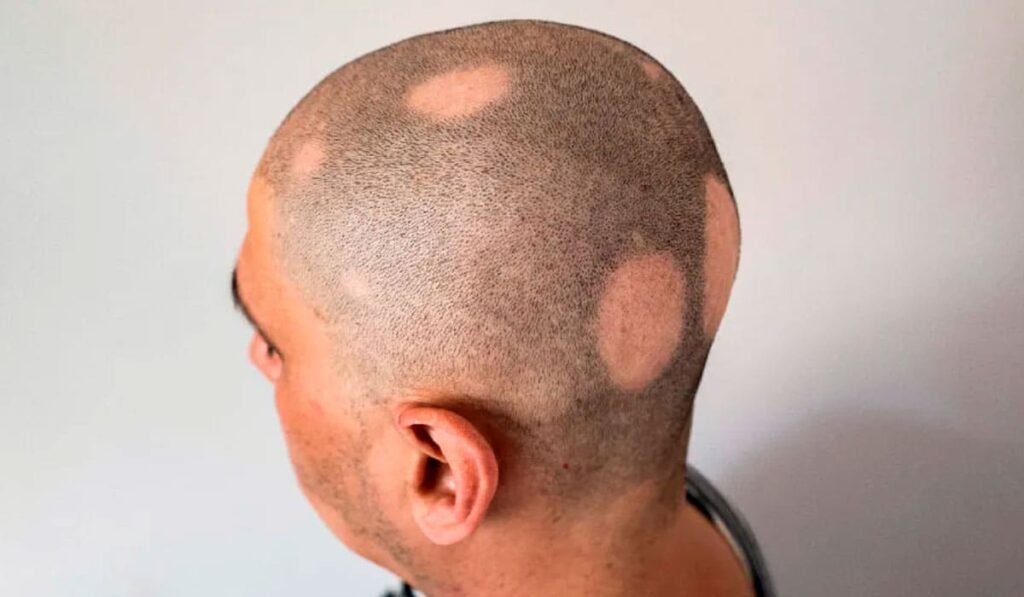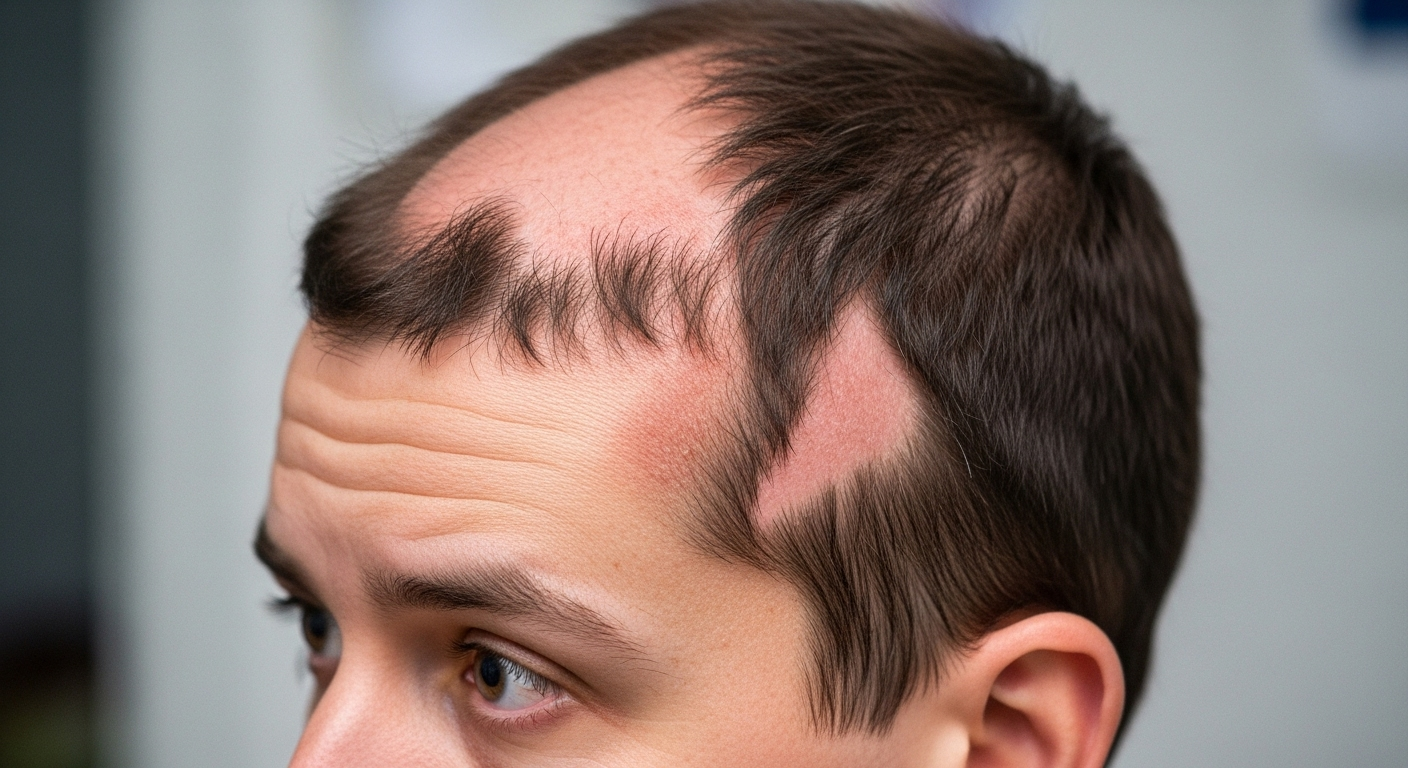Summary: Alopecia, particularly alopecia areata, is often linked to autoimmune diseases, where the immune system mistakenly attacks hair follicles. This article explores whether alopecia is an autoimmune disease, its causes, symptoms, and the latest treatment options. We'll also dive into the scientific evidence, expert opinions, and practical advice for managing autoimmune alopecia. Introduction Alopecia, especially …
Summary:
Alopecia, particularly alopecia areata, is often linked to autoimmune diseases, where the immune system mistakenly attacks hair follicles. This article explores whether alopecia is an autoimmune disease, its causes, symptoms, and the latest treatment options. We’ll also dive into the scientific evidence, expert opinions, and practical advice for managing autoimmune alopecia.

Table of Contents
Introduction
Alopecia, especially alopecia areata, is a common condition that leaves individuals questioning its origins. Is alopecia an autoimmune disease? In this article, we’ll explore the relationship between alopecia and autoimmune disorders, unraveling its medical connection. Discover how the immune system plays a role, learn about treatment options, and understand how to cope with this often misunderstood condition. By the end of this post, you’ll have a deeper understanding of the causes and solutions for autoimmune-related alopecia.
What is Alopecia? An Overview
Alopecia is a medical term used to describe hair loss, which can occur for various reasons. The most common forms of alopecia are androgenetic alopecia (genetic hair thinning), alopecia areata (an autoimmune condition), and telogen effluvium (temporary shedding due to stress or illness).
- Types of Alopecia
- Androgenetic Alopecia: Often referred to as male or female pattern baldness, this type is genetically determined and typically results in gradual thinning of hair.
- Alopecia Areata: This autoimmune disorder causes the immune system to attack hair follicles, leading to patchy hair loss.
- Telogen Effluvium: Triggered by stress, medications, or hormonal changes, this type causes widespread thinning.
- Scarring Alopecia: A rare condition where hair follicles are destroyed and replaced with scar tissue.
- Symptoms of Alopecia
- Patchy Hair Loss: Characteristic of alopecia areata, this can cause round, smooth patches on the scalp or other parts of the body.
- Thinning Hair: A common symptom across all types, often progressing slowly.
- Emotional Impact: Hair loss can affect self-esteem, leading to psychological stress and social withdrawal.
The Autoimmune Connection in Alopecia
What is an Autoimmune Disease?
An autoimmune disease occurs when the immune system mistakenly targets and attacks healthy cells in the body. Common autoimmune diseases include rheumatoid arthritis, lupus, and multiple sclerosis.
How Autoimmunity Relates to Alopecia Areata
Alopecia areata is an autoimmune condition where the body’s immune system targets hair follicles, thinking they are foreign invaders. This disrupts hair production, leading to hair loss in small, round patches.
Research and Evidence Linking Alopecia to Autoimmunity
Studies have shown that people with alopecia areata often have higher levels of autoimmune markers in their blood. Research published in the Journal of Clinical Investigation suggests that the presence of specific immune system antibodies in patients with alopecia supports its classification as an autoimmune condition.
Causes of Alopecia – Is Autoimmunity Always Involved?
While autoimmunity is a significant cause of alopecia areata, it is not the only factor. Alopecia can be influenced by various genetic and environmental elements.
Genetic Factors and Alopecia
Family history plays a crucial role in the development of certain types of alopecia. Individuals with relatives who have autoimmune diseases or alopecia areata are more likely to develop it themselves.
Environmental Triggers for Alopecia
Stress, illness, and certain medications can trigger or exacerbate alopecia areata. Environmental factors like exposure to chemicals or allergens also contribute to hair loss.
Other Factors Contributing to Alopecia
Diet:
Nutrient deficiencies can contribute to hair thinning.
Hormonal Imbalance:
Conditions like thyroid disorders or pregnancy can lead to temporary or permanent hair loss.
Diagnosing Alopecia and Understanding Autoimmunity
Proper diagnosis is crucial in determining whether alopecia is due to an autoimmune disorder.
How is Alopecia Diagnosed?
Physical Examination: A dermatologist will assess the pattern of hair loss.
Scalp Biopsy:
In some cases, a biopsy may be required to understand whether the condition is autoimmune-related.
Blood Tests:
To check for autoimmune markers, such as antibodies, a blood test may be conducted.
Can Autoimmunity Be Confirmed with Tests?
While there is no single definitive test for alopecia areata, blood tests for autoimmune antibodies can provide helpful insights into whether the hair loss is related to an autoimmune condition.
Treatment for Alopecia – Focus on Autoimmune Alopecia Areata

For individuals diagnosed with autoimmune alopecia, there are various treatment options available.
Topical and Oral Treatments for Alopecia
Corticosteroids:
Often prescribed to reduce inflammation and suppress immune activity. Can be applied topically or injected into the scalp.
Minoxidil:
A topical treatment that helps stimulate hair growth.
Immune Modulators:
Drugs like JAK inhibitors are being researched for their effectiveness in treating autoimmune alopecia by targeting immune system pathways.
Innovative Treatments for Autoimmune Alopecia
Stem Cell Therapy:
Some experimental treatments use stem cells to regenerate damaged hair follicles.
Platelet-Rich Plasma (PRP):
Involves injecting platelets into the scalp to promote healing and hair growth.
Psychological Support and Coping with Alopecia
Support groups, therapy, and counseling can be vital for managing the emotional impact of alopecia. Coping strategies such as wig use and head coverings can help restore confidence.
When to Seek Expert Help
If you notice rapid or unexplained hair loss, it’s essential to consult a dermatologist. Early intervention can improve the chances of regrowing hair and managing autoimmune alopecia effectively.
FAQs
Can alopecia go away on its own?
Answer: In some cases, especially in mild alopecia areata, hair may regrow without treatment. However, for more severe cases, medical treatment is necessary.
Is there a cure for alopecia?
Answer: While there is no cure for alopecia areata, there are treatments available to manage symptoms and promote hair regrowth.
How long does it take to notice hair regrowth?
Answer: With treatments like corticosteroids or minoxidil, patients may see hair regrowth within 3 to 6 months, though results can vary.
What triggers alopecia areata in autoimmune patients?
Answer: Stress, infections, and injury are common triggers that can exacerbate autoimmune alopecia.
Can alopecia be prevented?
Answer: While alopecia cannot be entirely prevented, avoiding known triggers and managing stress can help reduce the risk of flare-ups.
Conclusion
Alopecia, particularly alopecia areata, is an autoimmune disorder where the body’s immune system mistakenly attacks hair follicles. By understanding the autoimmune connection, its causes, symptoms, and treatment options, individuals affected by this condition can better manage their hair loss and seek appropriate medical care.
Ready To Take Your Next Step
If you’re struggling with alopecia or suspect it may be autoimmune-related, book a consultation with Dr. Uzma Irfan in Islamabad today. Get personalized treatment plans, expert advice, and the best solutions for managing your hair loss.






